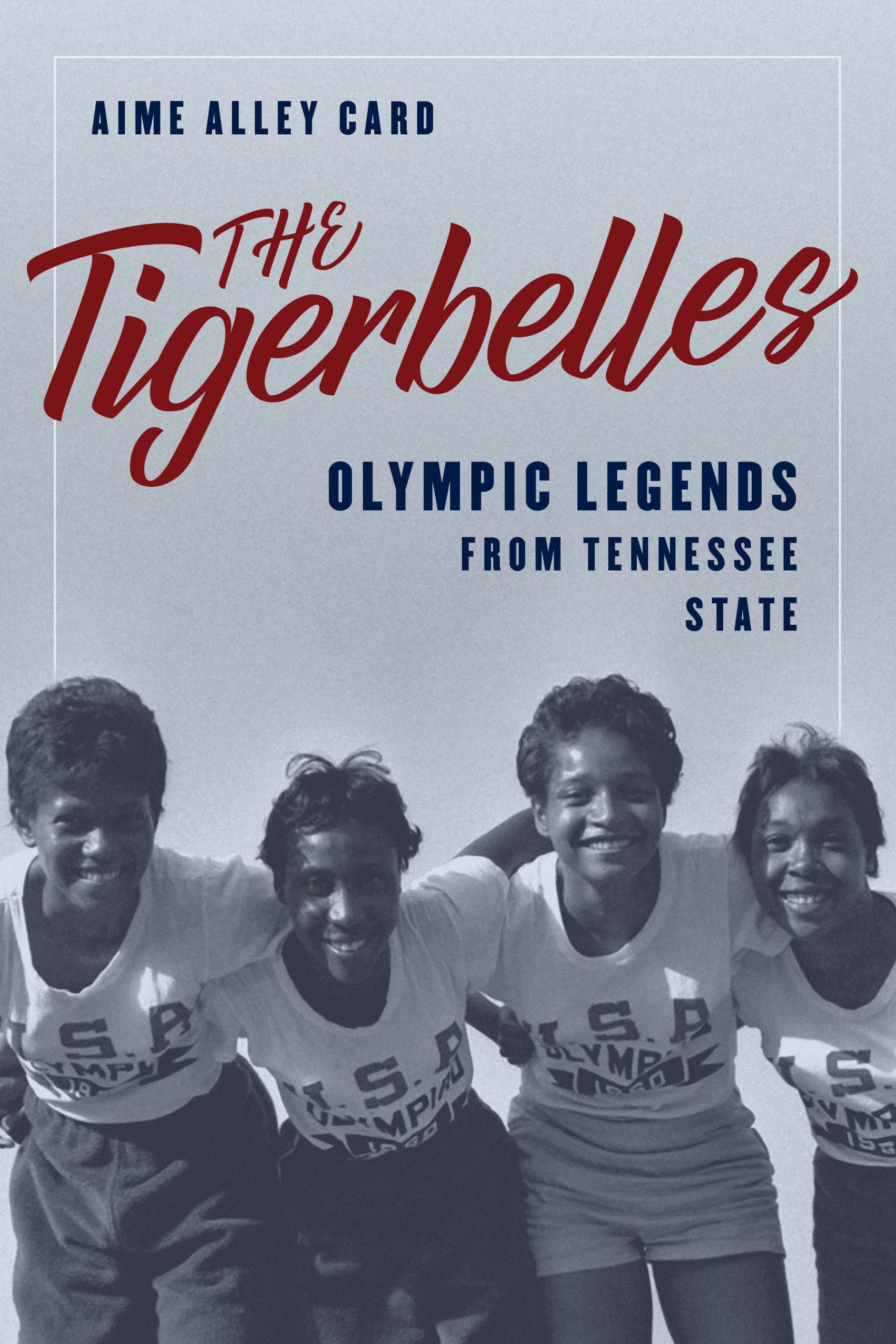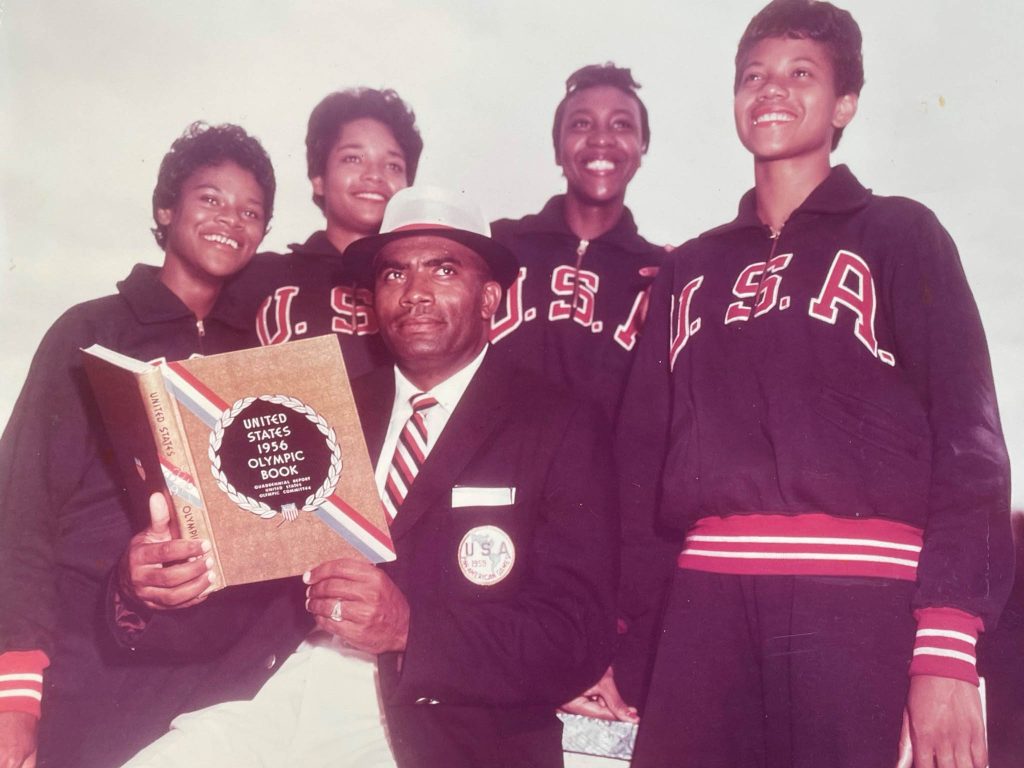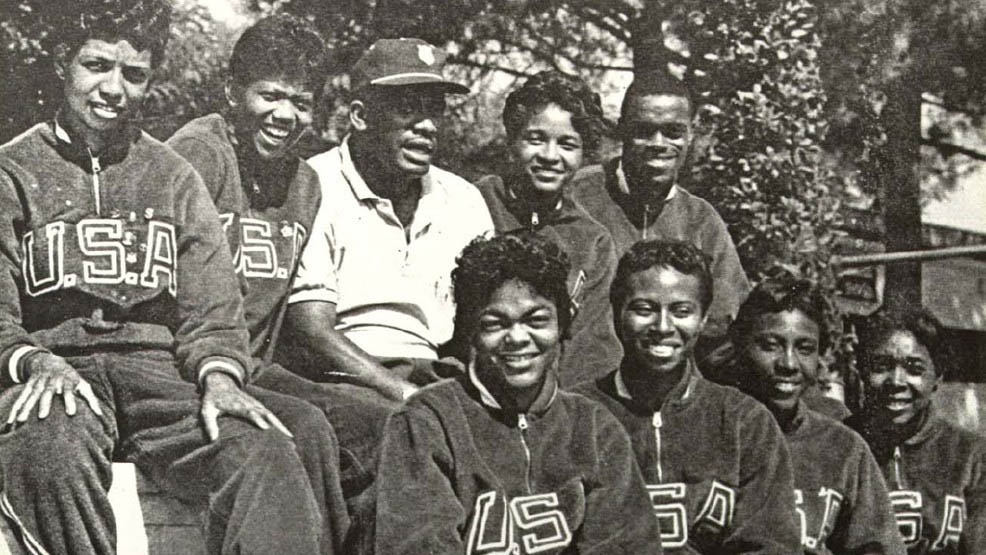
By Constance Garcia-Barrio
Most bookies would have looked askance at the prospects of Black women athletes in the South in the 1950s. “The Tigerbelles, Olympic Legends from Tennessee State,” by Aime Alley Card (Lyons Press, 2024), tells the story of how the steadfast collegians of TSU chewed up the odds and became some of the world’s fastest runners.

Aime Alley Card
Female athletes nationwide faced daunting roadblocks before Congress passed Title IX, a 1972 federal law that prohibits sex-based discrimination in any school or educational institution that receives federal funds. Women at TSU faced a double whammy, since track and field was treated like a stepchild of the school’s sports program.

From the left: Isabelle Daniels, Barbara Jones, Coach Edward Temple, Lucinda Williams, Wilma Rudolph
Photo credit: Special Collections and Archives – Tennessee State University.
The coach, Edward Temple, launched the track program in 1950 with a budget of $64.
“It was intended to cover all expenses, including travel to competitions, so it was either…uniforms or an out-of-state meet,” Temple said.
When the team and Temple scraped up enough money to attend the Tuskegee Relays, they got trounced.
But the Tigerbelles — so dubbed by Earl Clanton III, then TSU’s sports information director — were tough. Many of them came from struggling families in the Deep South, and college and track meant a ticket out of poverty. The grandparents of future Olympic star Willye B. White (1939-2007), from Greenwood, Mississippi, actor Morgan Freeman’s hometown, told her she could either “…go to college and get out of Mississippi, or stay home, get pregnant, and pick cotton the rest of her life.”
Tennessee native Wilma Rudolph (1940-1994) also faced a steep climb. One of 22 siblings, she had mumps, measles, and polio in childhood. For years, she had a brace on one leg. She wore dresses her mother sewed from flour sacks stamped with a floral design. But coach Temple recognized raw talent when he saw Wilma playing basketball in high school and recruited her for his team.

The Tigerbelles, from the left back row: Anna Lois Smith, Wilma Rudolph, Edward Temple, Barbara Jones, Ralph Boston; from the left front row: JoAnn Terry, Shirley Crowder, Lucinda Williams, Martha Hudson.
Photo credit: Special Collections and Archives – Tennessee State University.
The Tigerbelles owed much of their success to the grueling training program Temple devised. Card writes:
“The summer practice started with a boot camp so intense that it would not be allowed in today’s colleges… The team woke up at five a.m. and ran a five-mile cross-country trek repeated twice more in the day for two solid weeks. Boot camp was followed by hill sprints …[and] midday hauls in …suffocating heat. (The Tigerbelles also ran through pastures, racing past grazing cows).”
Besides detailing the Tigerbelles’ individual struggles, such as White’s rebelliousness and Rudolph’s pregnancy, Card writes about hard decisions the whole team faced. TSU, Fisk, Meharry College, and the American Bible College are historically Black schools within two square miles of each other. When Black students from these institutions began sit-ins at Nashville’s lunch counters in February of 1960, the Tigerbelles had to decide whether to join them. The team had reason to take part because they had experienced the indignities of segregation. They sometimes stopped on the way to track meets and relieved themselves at the side of the road because the restrooms were for whites only.
On the other hand, participation meant risking injury and arrest. It would have put them in danger of staying in jail, missing training, and possibly losing the scholarships that allowed them to attend college.
The book builds up to the tension of the 1960 Olympics, when the Tigerbelles competed against the Germans, Russians, and other elite runners, but Card folds humor into this crucial moment with anecdotes. One of them concerning Muhammad Ali, then known as Cassius Clay.
Coach Temple sat in the Olympic Village in Rome listening to the young boxer as “…he talked and talked and talked,” Temple said. “I was saying to myself that he must be crazy. He hasn’t even boxed yet.”
The races threatened to stress the team to the breaking point, but some of the women turned to their religious faith to see them through. Some of them had packed a Bible for the trip. Rudolph read from Ecclesiastes, “There is a time for everything,” Card writes.
“The Tigerbelles” is an exhaustively researched book, is written in clear, engaging language. Besides snippets of dialogue, many photographs recreate the era.
The book is a delicious read, but at several points, Card notes what a strict coach Temple was. He forbade the Tigerbelles to ride in cars with boys and reviewed their grades every semester. He also had a three-strikes rule. After a girl’s third misstep, he cut her from the team and gave her a bus ticket home. That said, when Card revisits Temple’s sternness several times, it tends to slow the story down a little.
But that’s a mere quibble in this uplifting book. Like Molly Schiot’s book “Game Changers: The Unsung Heroines of Sports History” (Wilma Rudolph is on the cover), “The Tigerbelles” offers page after page of inspiration. While Schiot’s book looks at challenges faced by women of different ages and ethnicities in sports from skateboarding to mountain climbing, Card’s book focuses specifically on Southern Black women who beat the odds.
“The Tigerbelles” covers events in the ‘50s and ‘60s, but the women’s stories offer megawatts of inspiration for today’s readers, old and young. The book ends with a chapter that tells what the Tigerbelles, Ed Temple, and others associated with the track team did after the 1960 Olympics. Their athletic achievements seemed to fuel their triumphs in other arenas.
For information, contact: [email protected] or call (800) 462-6420.

















Leave a Comment